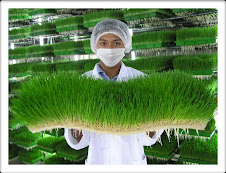Dear Readers, I'd like to share this article from Hewo.Com. It is a very relevant topic as Global Warming is becoming a major agenda in governments worldwide. And with upcoming movies like 2012, this is REALLY a becoming a serious issue. I am not a vegetarian, well not just yet. But I try as much as possible to avoid meat to the best of my abilities. I believe this has helped me a lot in my quest for good health. Read on ... |
"Since Al Gore’s An Inconvenient Truth short documentary movie came out in 2006, it has awakened people to the alarming Earthly facts, especially the hot cake topics surrounding global warming. We talk about industrial pollutions, drastic changes of weather patterns, deforestation and a whole lot more of big scale issues. But, there could be one issue that people might have overlooked. And that is meat consumption. |
|
|
| “Why? Meat does not look “polluting” enough to me. Are you being serious that if I continue eating hamburgers, chicken drumsticks and juicy sirloin steaks, I would actually be polluting Earth? I think you are preaching your religion of eating spinach to me.” |
|
|
| People can be sceptical when presented about how meat consumption should be reduced to tackle global warming. And you must be wondering why eating meat could cause damage to our Mother Earth. |
|
|
|
|
| The meaty effects |
|
|
| First of all, meat industry emits more greenhouse gas than any factor given. According to the United Nations, total amount of greenhouse gas emitted by livestock farms and meat-processing factory is around 18% of the total greenhouse gases emitted into the atmosphere, making it the largest single factor in causing greenhouse gas. |
|
|
| Second, meat production takes more resources than growing vegetables and fruits. Growing meat is never efficient. We need 16 times as much grains to produce meat, and we need another 16 times as much resources as to produce these grains to feed our cows, lambs, goats and chickens. Around 70% our grown vegetations are being used to feed livestock, just for them to produce enough meat for us. Besides that, we also need to put in power to refrigerate our meat, to process them, and to ship them throughout the world. |
|
|
| Third, we need enormous water supply to produce meat. According to a statistic made by John Robbins in his book Food Revolution, we need 99.6% lesser water to grow one pound of potatoes, than to grow one pound of beef, and 97% lesser water than to grow one pound of chicken. Aside from supplying water to livestock as their drinking water, we need to constantly wash them, clean up their cages from accumulating faecal wastes, as well as to clean up the mess after we butchered them. To be specific, it takes 5214 gallons of water (or about 19731 litres) to produce one pound of beef. |
|
|
| Last but not least, eating meat cuts more land. In fact, raising animals for food takes up more land than to grow crops directly. We need 16 pounds of grains to produce 1 pound of beef. This means in order to grow beef, we need 94% more land to cultivate grains for them, and more land needed means more pesticides needed. Instead of producing food for us, they are more like processing food for us, in a reverse way. According to a recent study by PETA.org, more than 90% of Amazon rain forest was cleared since 1970 is used for global meat production. |
|
|
| To be green, we don’t have to sweat. We just need to change what we eat, because what we eat determines how we get it, and how we get it determines what kind of effects our surroundings will get. You can keep earth green by simply not eating any animals. |
|
|
| Quit meat! It’s not just good for your body; it’s good also for your earth." |
Monday, November 2, 2009
Why Going Vegetarian Supports the Environment
 I am an executive based in Makati with a passion for promoting good health - the natural way. I hope to share whatever knowledge I gain from the people I meet and the books I read so that others will benefit.
I am an executive based in Makati with a passion for promoting good health - the natural way. I hope to share whatever knowledge I gain from the people I meet and the books I read so that others will benefit.
Subscribe to:
Comments (Atom)



